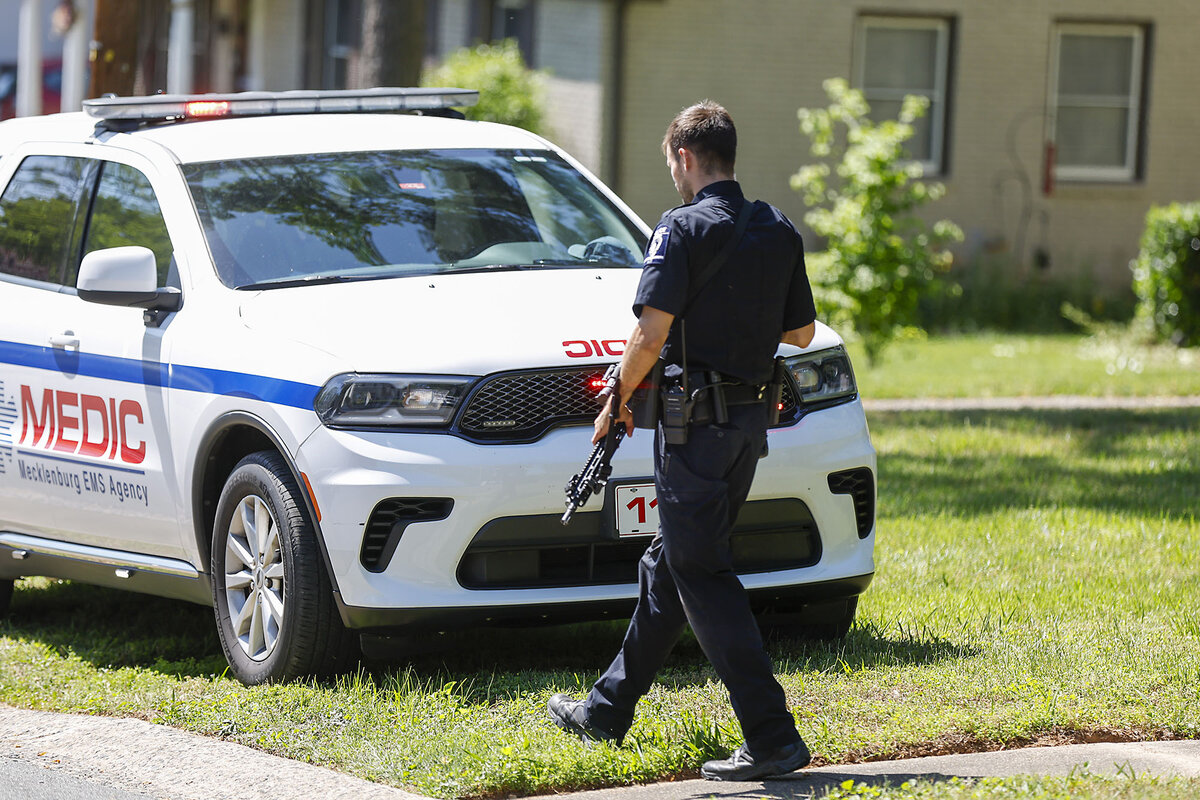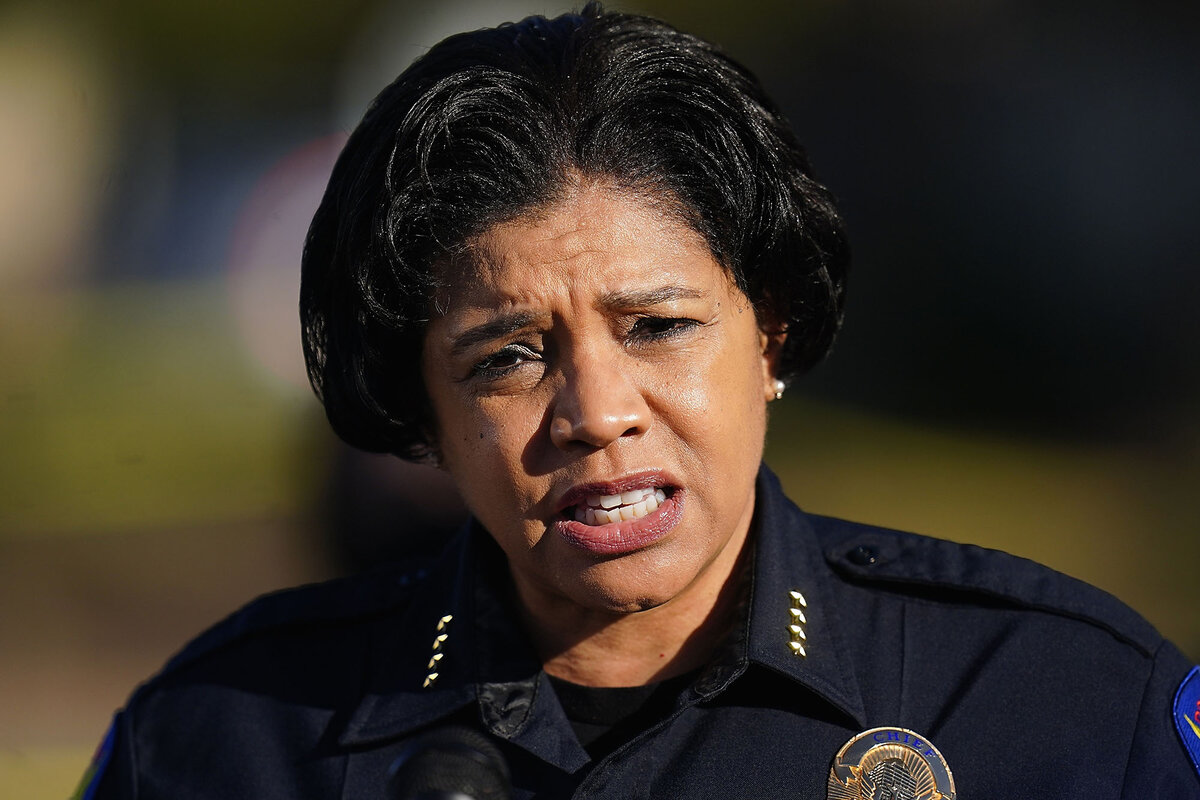Police are begging lawmakers to stop relaxing gun laws. Charlotte shows why.
Loading...
From New York to Texas to Alabama, law enforcement officials have warned for years that relaxing gun laws would lead to more violence toward police. The fatal shooting of a local police officer and three members of a fugitive task force in Charlotte, North Carolina, on Monday seems to bear those fears out.
The task force including U.S. marshals was trying to arrest a man for possession of a firearm by a felon. The man used an assault-style rifle to kill the four officers and wound four others before being killed himself.
Behind such incidents, in part, is a changing atmosphere around gun rights. Law enforcement officers themselves sometimes walk a thin blue line between lobbying for gun restrictions and having a wider conservative worldview of gun rights as sacrosanct.
Why We Wrote This
A story focused onSafety is essential to civilization. A shootout that left four officers dead in North Carolina is a blow to the police community itself, at a time of strain between some officers and politicians over gun laws.
For much of U.S. history, most states lacked laws around carrying concealed weapons. In the past 50 years, many have relaxed concealed handgun restrictions.
While most states still require a permit, a growing number now let people carry concealed weapons without one. Some have loosened laws even further, moving from granting gun permits for those with a legitimate need to carry a weapon, to passing laws guaranteeing the right to a concealed-carry permit for anyone not specifically prohibited from doing so.
Between 2015 and 2021, the number of concealed-carry permit holders in the United States grew from 14 million to 21.5 million. In 2022, the Supreme Court ruled as unconstitutional the use of subjective criteria in granting concealed-carry permits.
Today, 29 states no longer demand a permit, or training, to carry concealed weapons. Much of that shift is driven by what gun rights activists call a “good guy with a gun” scenario that, in effect, enlists parts of the population to help keep the peace.
But encouraging armed self-defense also creates deep expectations in the U.S. that gun ownership is absolute, experts say. It also makes it hard to tell good guys from bad guys – especially when police can no longer confront citizens wearing guns in public.
“Police are at a definite disadvantage when it comes to the Second Amendment,” says John Violanti, a former New York State Police trooper and now a research professor at the University at Buffalo. “If we have a right to bear arms, we have a right to bear arms. But how do you deal with that?”
This year has already seen 98 officers shot in the line of duty between January and March, with 10 of those officers dying, according to the Fraternal Order of Police, which tracks those statistics. Last year, the organization recorded 378 officers shot – the highest number on record. Forty-six were killed by gunfire and 20 in ambush attacks.
Former Phoenix Police Chief Jeri Williams called for a federal ban on assault-style weapons and high-capacity magazines. In 2022, she told Congress: “We are outgunned. We’re outmanned. We’re out-staffed.”
Yet Republicans have often ignored those calls as Second Amendment absolutism has spread, anchored by key Supreme Court decisions.
“The [political] difficulty here is that police are in the line of fire but they are a conservative element of the nation’s law and order tradition,” says Cal Jillson, a political scientist at Southern Methodist University. “Conservatism today is a wholesale defense of the Second Amendment and the right of the individual to carry arms for personal protection.”
The Giffords Law Center’s Annual Gun Law Scorecard, which ranks and grades state gun laws, has found that gun violence in general and against police in particular is higher in states with looser gun laws. It follows, then, that states with stronger gun laws have fewer gun deaths, the center reports. Looser gun laws also infuse tensions into scenarios like that in Charlotte, where police are trying to separate unlawful carriers from their guns.
In 2023, however, North Carolina Republicans suddenly pulled a constitutional-carry bill from a floor vote. A year earlier, state lawmakers had overridden a veto by the governor, relaxing gun laws to allow pistols to be sold without permits. Part of the resistance to the 2023 bill came from the North Carolina Sheriffs’ Association. In killing the bill, Senate Leader Phil Berger wondered if there was really a need to expand gun rights further in the Old North State.
As Charlotte residents watched a procession for one of the fallen officers Tuesday, there was a sense that more could be done to protect the protectors.
On X, Mecklenburg County Board of Commissioners Chair George Dunlap called the shootings “senseless and preventable.”








